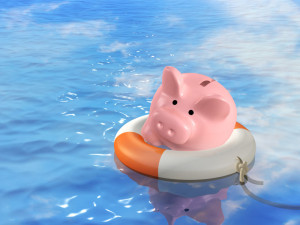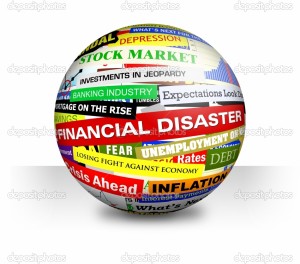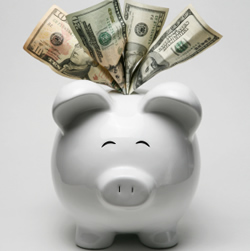March 14, 2013
 You work hard for the money you earn, so saving money might not be a priority. However, it is important that you have an emergency fund in case the unexpected should occur. My mentor and first boss at my management training program taught me these five reasons you should have emergency savings.
You work hard for the money you earn, so saving money might not be a priority. However, it is important that you have an emergency fund in case the unexpected should occur. My mentor and first boss at my management training program taught me these five reasons you should have emergency savings.
1. You lose your job: With the struggling economy, companies are being forced to lay off employees. Just because you are an outstanding employee does not mean you are not susceptible to unemployment. In addition, you could be the victim of health issues, so you cannot work. Whatever the reason, having an emergency fund will help pay the bills while you are not working.
2. Medical Bills: You never know when you will encounter a major medical condition. You could be diagnosed with a disease, or you could be in an accident that could result in serious injuries. Your medical insurance will only last for so long before you are required to pay the bill. A savings fund will help you pay the mortgage and other bills, so you can avoid foreclosure.
3. Your car decides to quit: You are driving down the road, and you hear a loud clanging noise. You take your car to the mechanic, and the news is not good. You must have a car to get to work or to the store. You will then decide if it will be cheaper to get the car repaired or just buy a new one. Your emergency savings account will prevent you from going into debt.
4. A family member dies: If a loved one dies and you need to get to the funeral, you can dip into your emergency savings to purchase a plane ticket. If you drive, gas is expensive, so you will need extra money to cover the cost. You might also need to help cover funeral and burial expenses.
5. Home Repairs: Your air conditioning goes out in the middle of the summer, or your roof starts leaking during a flood. Your refrigerator might decide to quit working. In addition, you never know when your home insurance might suddenly increase. By having emergency savings, you will be able to pay the bill without putting it on your credit card or taking out a loan.
Emergency savings can prevent you from having serious debt problems or from selling off your assets. If you have invested in gold for instance then that’s something you want to be able to hold on to. You can use the money from your savings account rather than going deeper into debt. Saving money is important to prevent financial problems.
Tags:
budgeting,
economy,
financial planning,
Funding,
money,
savings
March 13, 2013
 Any parent will understand the need for careful financial planning to safeguard future prospects. Investing in the future of our children, whilst sometimes can be a financial strain on the household budget, can also teach them about money and all things related. The lack of education surrounding money matters leads to an unawareness of the value of money and how financial planning can assist day to day life and future endeavours. It is the role of the parent, to begin early, to ensure a brighter future possible for their child.
Any parent will understand the need for careful financial planning to safeguard future prospects. Investing in the future of our children, whilst sometimes can be a financial strain on the household budget, can also teach them about money and all things related. The lack of education surrounding money matters leads to an unawareness of the value of money and how financial planning can assist day to day life and future endeavours. It is the role of the parent, to begin early, to ensure a brighter future possible for their child.
Money Education –
Educating children on all things money related can be quite difficult. Whilst they may want to spend their readily available cash on a new computer game, a parent can teach their child about finances early on with the help of a savings account. Whilst the child may not be overly enthusiastic about this idea at first, the long term possibilities of having a good financial start to their future will stand them in good stead.
A savings account for a child is an important tool to help them see how money can grow. The decision to put a little by every month into this account should be budgeted for, but money received for birthdays and holidays can be deposited too. Whilst the overall control of the account would remain with the parent, the child can be shown how their little ‘nest egg’ is growing, building a possible university or first car fund.
Invest in Child Education Plans –
With the cost of attending university running into tens of thousands of pounds, it has never been more important to begin a fund as soon as possible; to enable your child to have more options. Whilst this financial planning may have been reserved for the upper classes at one point, it is now deemed as an essential part of investing in your children’s future, regardless of class. It is true that unfortunately some parents may not be able to afford this planning, which is now considered a luxury. Any small amount adds up to ensure your child can have a brighter future.
Make Provisions –
The cost of raising children can run into hundreds of thousands. Whilst it is true that it is not always possible to plan for all eventualities, an emergency fund can come in pretty handy. School trips, hospital stays, computing equipment and extra tuition can all add, to an already tight budget. Unfortunately, they can all come with very little to no notice. By putting a little aside every month, a parent can provide for many eventualities in life which haven’t been planned for.
Children Learn by Example –
A child will often see many things that may not be actually said. They are increasingly aware of their surroundings, the atmosphere and any potential conflict or stress. Parents often do not realise that children take many memories of their childhood with them, often shaping who and what they become. If a parent is a careful money planner, explaining the reasons behind it, a child will grow to be aware of the importance of money and financial planning.
Children may not understand when they are little, the value of money and how to plan for the future. That is expected and understandable. Subconsciously, the lesson will be taught through the actions of the parents, how they cope financially, how they save and how bills are paid. Saving for a treat over a period of time can be a valuable lesson to children about the importance of money and how it can grow. Planting the seed early can ensure a well educated and finance ready child growing into adulthood.
Tags:
Child Investment,
financial planning,
money,
savings
February 16, 2013
 Dropping the financial ball is something that may happen inadvertently when we allow debt to go farther than we can run with it. Staying away from debt is sometimes hard because countless expenses sum up through the month and control can easily slip out of our hands. However, you can prevent this from happening and yet stay away from debt by simply analyzing your actual financial situation and the way that your organize your expenses.
Dropping the financial ball is something that may happen inadvertently when we allow debt to go farther than we can run with it. Staying away from debt is sometimes hard because countless expenses sum up through the month and control can easily slip out of our hands. However, you can prevent this from happening and yet stay away from debt by simply analyzing your actual financial situation and the way that your organize your expenses.
Planning is the Key
You cannot anticipate unexpected expenses coming your way, but you can plan those that occur regularly to find out how much money you have to work with for something else. Creating a monthly budget is a great aid, because you cannot only plan the payment of bills, food, gas and daily living expenses, but also serves to determine how much money you can save, and make that money a cash fund to be used for unexpected expenses rather that borrowing money when an emergency takes place.
Avoid Loans Above All Else
No matter, if you are considering taking out an “inoffensive” payday loan, a personal loan, car loan, business loan, mortgage or home loan. Loans are usually the starting point for major financial problems even if you have the certainty that you can repay your debt. People often forget that if they are borrowing $100 will not have to repay $100 but a considerable amount after interest rate, finance fees and particularly with payday loans, very high interest rates.
Plastic Money is Dangerous
Another source of debt can be found in your credit cards. The more credit cards you have, the easier it is that you can become trapped in debt sooner or later. Be wise to use your credit cards only when you need them, even if you have only one, but if this not your case, determine which one charges the least in interest rates and make this your main credit card, but only to be used when you need are forced to pay with a credit card.
Cash is Still the Leader
No matter if people turn their heads back to you when paying with cash in a restaurant, do it anyway and you will be far from dropping the financial ball, as they probably have done sometimes. Cash is worth more than plastic money because it has immediate acquisitive power, can be use to buy almost anything, and does not generate interests.
If you stick to these simple principles, you will be on the right pathway to stay away from debt, and you can learn many other tips that will enhance your household economy.
Tags:
budgeting,
debt,
economy,
financial planning,
money,
personal finance,
savings
February 4, 2013
 Moving ranks close to root canals on the list of items people would rather avoid. Here’s six questions everyone should ask themselves to help make moving less financially stressful.
Moving ranks close to root canals on the list of items people would rather avoid. Here’s six questions everyone should ask themselves to help make moving less financially stressful.
1. How Much Are You Moving?
Whether you have the contents of a dorm room or a three-bedroom house can make a large impact on the cost of your move. Each box and each piece of furniture will carry its cost in time, sweat, and cash. Pare down as much as you can. Donate and trash anything that you haven’t used in the last a year to free up moving space.
2. How Will You Store Your Stuff?
If you are moving to a smaller place or have a temporary lull until the final location is available, using storage units might be necessary. Again, rent the smallest unit available that will hold your items and be sure to use sturdy stackable containers that are moisture-resistant. Look at the design of the new home and plan ways to store and organize your belongings before moving in.
3. Will You Need Outside Help?
If you have furniture or major appliances, you should request help from friends and family. Use their help to navigate large items with a dolly into the moving van. If friends or family have trucks or trailers, use those before resorting to renting a moving truck. Unless you are moving extremely large amounts, you likely won’t need to hire a moving company.
4. How Much Do You Need for Utilities?
Make sure to reserve some money in the budget for new setup of utilities. Many require a deposit, installation fee, or other initial costs. This includes electric, water, gas, cable, phone and internet, and garbage removal. Also, if you are the owner of the property, you’ll want to change the locks.
5. Where Can You Find Packing Supplies?
Buy your materials in bulk from a warehouse club or shipping outlet rather than the moving company. Or better yet, ask local retailers if they have boxes that they can give you for free. Make sure to clearly mark each box for the room it belongs to. Keep one “open first” box that includes toilet paper, cleaning wipes, trash bags, and whatever you need to sleep the first night. In all the chaos, it will be nice not to have to hunt for those items.
Tags:
budgeting,
Cash Flow,
financial planning,
money,
savings
December 21, 2012
 Thanks to rising costs in general and the need to save a bit more, Christmas has started to get harder to deal with on a financial basis with each new year. Those with big families tend to find it the hardest, but everyone can benefit from a few simple budgetary tips.
Thanks to rising costs in general and the need to save a bit more, Christmas has started to get harder to deal with on a financial basis with each new year. Those with big families tend to find it the hardest, but everyone can benefit from a few simple budgetary tips.
There are so many options and methods to be implemented to ensure that you are not overstretched at Christmas and all shouldn’t be too hard to apply to your festive spending habits.
- Although this is perhaps a tip that is a bit late, it is certainly one that is effective; the tip being to start your Christmas shopping early. This allows you to take your time and survey all the numerous offers and sales that are almost certain to be in effect. Remember to look on the internet as well as the high street for deals.
- Using online vouchers or eMoney will help restrict your expenditure, as well as ensure your payments are safe and anonymous. Online vouchers from somewhere such as Ukash only allow you to put a certain amount of money on them and so you can’t spend any more than you have on the voucher.
- Setting a maximum budget for all the people on your shopping list allows you to see the most you will spend on Christmas presents and so you can budget for that set amount, because as long as you don’t go over it, you can set your other budgets in relation to your shopping list.
- Another good tip is to buy early if you’re buying online. Some online stores hike up the delivery prices in the run up to Christmas to take advantage of those late to Christmas shopping and have no choice but to pay the heightened prices.
- Ensure that you are realistic about what you can afford and that you have considered all the other expenditure that is coming out that month that might include heating, gas and water, as well as the likes of travelling costs over the festive period.
Implementing these tips will help you save bundle of money each Christmas and may even inspire you to more helpful tricks to help curve expenditure at one of the most expensive parts of the year.
Tags:
budgeting,
Cash Flow,
Christmas,
Festive Season,
financial planning,
money,
savings
 You work hard for the money you earn, so saving money might not be a priority. However, it is important that you have an emergency fund in case the unexpected should occur. My mentor and first boss at my management training program taught me these five reasons you should have emergency savings.
You work hard for the money you earn, so saving money might not be a priority. However, it is important that you have an emergency fund in case the unexpected should occur. My mentor and first boss at my management training program taught me these five reasons you should have emergency savings.




Recent Comments